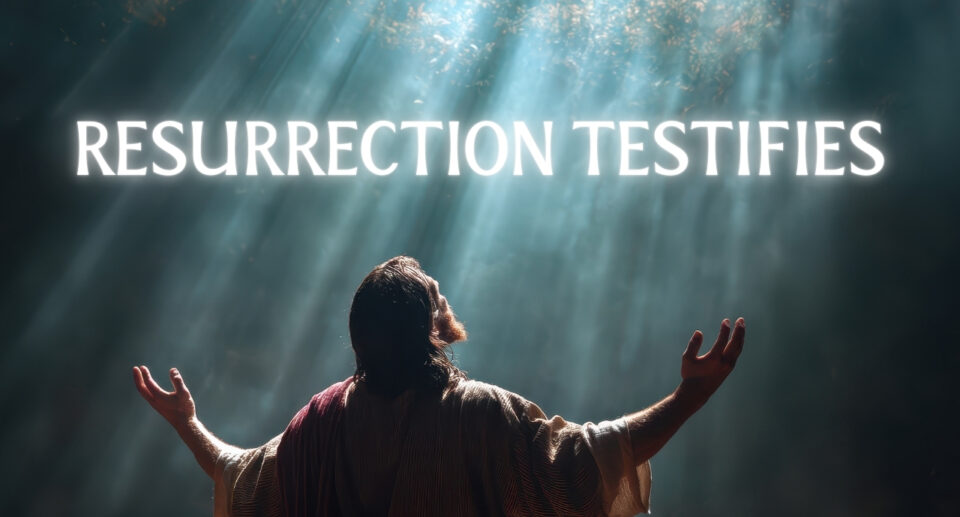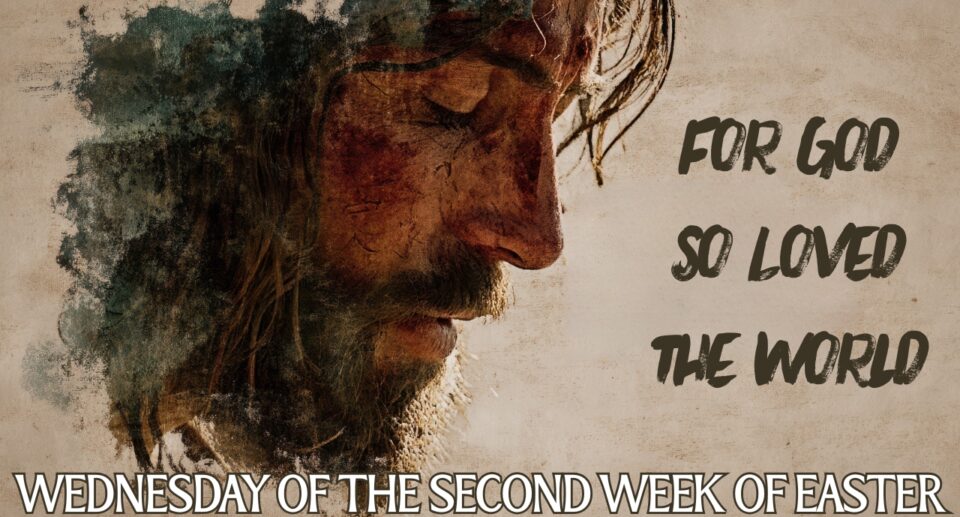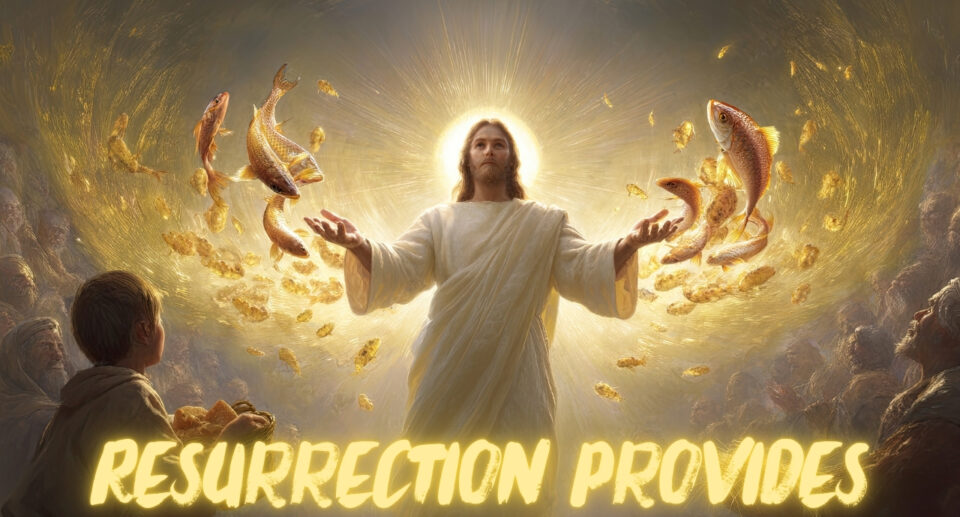Sacred Defiance: When Obedience to God Transcends Human Authority | Daily Readings | May 1, 2025

“We must obey God rather than human beings!” With these bold words, the apostles defied the same authorities who had executed Jesus. Discover how this moment of sacred defiance reveals the hierarchy of allegiance that sustains authentic Christian witness even amid opposition.
Through this reflection, you’ll discover:
- Why the apostles’ stance wasn’t rebellion but radical obedience
- How “eternal life” transforms our response to earthly threats
- What sustains courage when systems resist divine disruption
- Where similar moments of decision appear in contemporary life
Readings covered: Acts 5:27-33; Psalm 34:2 and 9, 17-18, 19-20; John 3:31-36
Timeline: 00:00 Introduction 00:50 First Reading 03:15 Psalm Response 05:30 Gospel Reading 07:45 Reflection 18:10 Closing Prayer
Perfect for anyone wrestling with competing claims on their allegiance, facing pressure to compromise conviction, or seeking to understand the proper relationship between divine and human authority.
#CatholicDailyReadings #SacredWitness #DivineFidelity
Sacred Defiance: When Obedience to God Transcends Human Authority
“We must obey God rather than human beings!”
Five words of sacred defiance spoken before the highest religious tribunal in Judaism. Five words that mark the line where compromise ends and conviction begins. Five words that have echoed across centuries whenever followers of Jesus have faced the choice between cultural acceptance and divine allegiance.
Peter and the apostles stand again before the Sanhedrin. The same council that condemned Jesus now demands their silence about him. The same authorities who orchestrated his crucifixion now expect compliance from his followers.
But something has fundamentally changed. These once-fearful disciples who denied knowing Jesus and hid behind locked doors now stand with unflinching resolve. When commanded to stop teaching about Jesus, their response is both simple and revolutionary: “We must obey God rather than human beings!”
This isn’t reckless rebellion or adolescent defiance of authority. This is the measured conclusion of people who recognize a hierarchy of allegiance. When divine imperative conflicts with human demand, the choice becomes clear though never easy.
Notice what follows this declaration. The apostles don’t merely refuse to comply; they immediately proclaim the very message they’ve been ordered to suppress: “The God of our ancestors raised Jesus from the dead—whom you killed by hanging him on a cross. God exalted him to his own right hand as Prince and Savior that he might bring Israel to repentance and forgive their sins.”
These words strike directly at the Sanhedrin’s authority. By executing Jesus, they opposed God’s purpose. By silencing his witnesses, they resist divine intent. The apostles aren’t just refusing an order; they’re exposing a profound misalignment between religious authority and divine will.
The council’s response is telling: “They were furious and wanted to put them to death.” When authority is challenged, its instinct is often to intensify control rather than examine its own alignment with higher purpose. The pattern repeats throughout history: power confronted often becomes power entrenched rather than power examined.
Our psalm illuminates what sustains such courage: “The LORD is close to the brokenhearted and saves those who are crushed in spirit.” This isn’t triumphant bravado but vulnerable dependence. What appears as defiance toward human authority flows from profound submission to divine presence. The apostles stand firm precisely because they’ve been broken and rebuilt by encounter with the risen Christ.
Then our Gospel from John completes the picture. Jesus declares, “The one who comes from above is above all; the one who is from the earth belongs to the earth.” Here lies the foundation for sacred defiance. The apostles recognize authority from above that transcends authority from earth. Their allegiance isn’t to rebellion but to proper hierarchy—heaven’s voice above human directive.
Jesus continues with words that explain the apostles’ transformation: “Whoever believes in the Son has eternal life.” This isn’t just future promise but present reality—life of a different quality and source that relativizes earthly threat. The apostles speak and act as people already participating in eternal reality. Physical imprisonment or even death cannot threaten what they’ve found in Christ.
What does this mean in our world where authority still demands allegiance and systems still resist divine disruption?
First, these readings challenge our instinct toward comfortable compliance. We naturally seek approval from those with power over us—employers, government officials, cultural gatekeepers, even religious authorities. Yet sometimes, these powers operate from earthbound perspective rather than heavenly wisdom. Sacred defiance begins with discernment: Which voice ultimately commands my allegiance?
Contemporary examples abound: Healthcare professionals who refuse to participate in procedures that violate their understanding of human dignity. Business owners who decline projects that compromise their ethical standards. Citizens who engage in civil disobedience when laws perpetuate injustice. Religious believers who resist institutional policies that contradict their understanding of divine will. Each faces the same essential question: When authorities conflict, which deserves ultimate obedience?
The apostles’ example provides crucial guidance. Their defiance wasn’t reckless but reasoned. They didn’t reflexively oppose authority but recognized its proper limits. They weren’t seeking personal freedom but remained constrained by divine obligation. They didn’t merely refuse compliance but offered clear articulation of higher allegiance.
Our psalm reminds us what sustains this posture: “The righteous cry out, and the LORD hears them; he delivers them from all their troubles.” Sacred defiance isn’t self-sufficient protest but dependent trust. The apostles stood firm because they stood with and in the One who promised presence amid persecution.
The Gospel completes our understanding with Jesus’ declaration: “The Father loves the Son and has placed everything in his hands.” Ultimate authority already rests with Christ, even when temporal power appears to rest elsewhere. The apostles weren’t creating conflict but recognizing reality—Jesus as “Prince and Savior” already outranks every earthly authority.
This recognition transforms apparent defiance into authentic obedience. The apostles weren’t being rebellious but radically obedient to the highest authority. Their seemingly seditious stance flowed from ultimate submission to divine purpose.
The council’s furious reaction reveals the cost of such alignment. Sacred defiance rarely meets calm consideration. Systems resist examination of their own legitimacy. Powers challenged typically respond with increased pressure rather than self-reflection.
Yet something remarkable happens when believers stand firm despite escalating threat. The very pressure intended to silence often amplifies the message. The Sanhedrin’s opposition didn’t diminish the apostles’ witness but magnified it. Their persecution didn’t extinguish the movement but fueled its spread.
Throughout history, this pattern repeats. From early Christian martyrs whose deaths inspired conversions to modern witnesses whose imprisonment galvanizes movements, sacred defiance often achieves what compliance never could. The council’s fury became the backdrop against which apostolic courage shone more brightly.
In our own lives, similar moments of decision arise—perhaps not as dramatic as standing before tribunals but no less significant in determining the direction of our witness. When professional advancement requires ethical compromise, when social acceptance demands silence about conviction, when personal comfort conflicts with costly obedience, we face our own version of the apostles’ dilemma.
Their response offers both challenge and comfort: challenge to recognize the proper hierarchy of allegiance, comfort in knowing that divine presence sustains those who choose obedience over acceptance. “We are witnesses of these things, and so is the Holy Spirit, whom God has given to those who obey him.”
This is the heart of sacred defiance—not rebellion for its own sake but radical allegiance to transcendent purpose; not rejection of legitimate authority but recognition of its proper place; not self-sufficient protest but dependent trust in divine presence.
So the invitation stands: When faced with competing claims on your allegiance, will you distinguish between voices from above and voices from earth? When pressured to compromise conviction for comfort, will you remember that “the Father loves the Son and has placed everything in his hands”? When threatened with exclusion or punishment for faithful witness, will you trust that “the LORD is close to the brokenhearted”?
For in these moments of sacred defiance, we join a lineage that stretches from apostles before the Sanhedrin to contemporary witnesses before modern tribunals—ordinary people who recognized extraordinary truth: ultimate obedience belongs to God alone.






